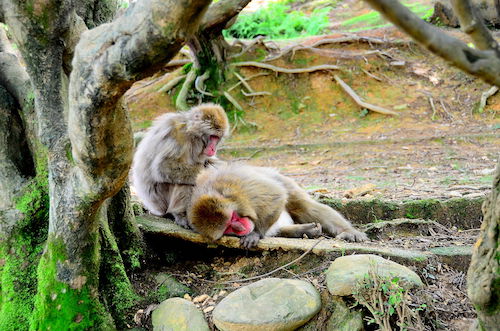 Evolution
Evolution
Why Do Monkeys Not Speak? Because They’re Not Human

A study in Science Advances indicates that monkeys could speak — they have the anatomic wherewithal, an adequate vocal tract — if only they had the brains to go with it.
The miracle of the Darwinian mechanism is that it gives to creatures, or rather retains on their behalf, what is adaptive, that is to say, useful. So evolving the sophisticated equipment specially required for a skill your species will never develop seems a bit puzzling.
A talking monkey seems like a thing of science-fiction, cartoons, and goofy advertisements. But new research suggests monkey speech may be closer to reality than commonly thought.
Macaques actually have vocal anatomy capable of human-like speech, according to a study published Friday in the journal Science Advances.
“This suggests that what makes people unique among primates is our ability to control the vocal apparatus, not the apparatus itself,” Thore Jon Bergman, an evolutionary biopsychologist at the University of Michigan who was not part of the research, writes in an email to The Christian Science Monitor.
On Friday, a team of researchers reported that monkeys have a vocal tract capable of human speech. They argue that other primates can’t talk because they lack the right wiring in their brains.
So far this overlooks the question of why animals would evolve a capacity for which they had no use. It’s not as if an appropriate vocal tract is simply a gimme. Monkeys were previously thought not to be furnished with one. Finally, a science reporter ventured to ask about this.
“I hope that this new data dispels forever the widespread myth that monkeys and apes cannot speak because of anatomical limitations of their vocal tract,” lead author Tecumseh Fitch of the University of Vienna’s Department of Cognitive Biology told Seeker.
Fitch, senior author Asif Ghazanfar, Bart de Boer and Neil Mathur investigated the range of movements that primate vocal anatomy could produce. Using X-ray videos, they captured and then traced the movements of a macaque’s tongue, lips, larynx and more as the monkey vocalized, ate and made facial expressions. The researchers then used these X-rays to build a computer model of a monkey vocal tract, allowing them to answer the question: What would monkey speech sound like, if a human brain were in control?
…
The experiment worked out great, and yet we’re still left with the fact that monkeys and apes do not talk as we do. The explanation turns out to be more complex, and controversial, than you might think.
First, Fitch and his team believe that most mammals possess flexible, speech-ready vocal tracts. He said, “It seems clear that this type of flexibility evolved early on, for reasons other than vocalization, probably initially for food processing — manipulating and swallowing food.” [Emphasis added.]
Oh, it evolved for “food processing,” they say. To go with every biological mystery, evolution never fails to puts its finger on a speculative story. Yet again, previously scientists looked at monkeys and other mammals, which universally share the practice of nourishing themselves by eating food, and concluded that that they were not “speech-ready.”
On the plus side, the new view underlines what Wesley Smith calls human exceptionalism. From New Scientist:
Philip Lieberman at Brown University in Providence, Rhode Island, says: “I’ve pointed out for decades that monkeys could talk, with reduced intelligibility, if their brains could learn and execute the motor acts involved in speech.”
That’s a big if. Now that anatomy is removed as an explanation for their reticence, the obvious truth is left as the remainder: Monkey don’t speak because they are not human.
Photo: Japanese macaques, by Dariusz Jemielniak (Own work) [CC BY-SA 3.0], via Wikimedia Commons.
